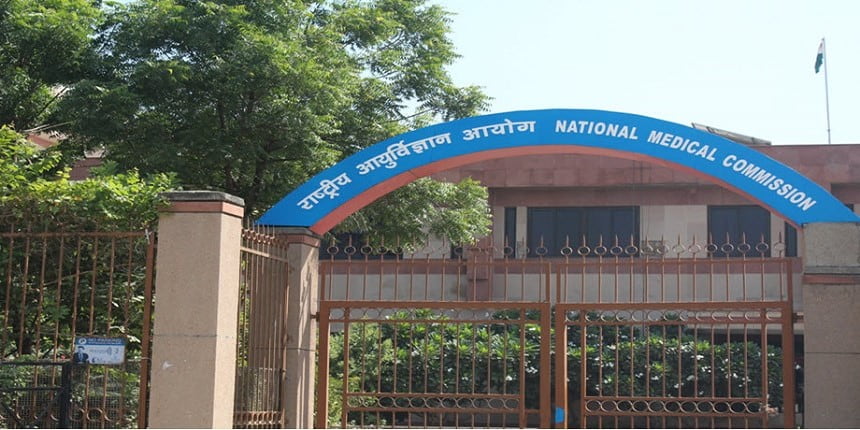NMC revises CBME guidelines for MBBS curriculum; drops reference to gay sex as ‘unnatural’
Sanjay | September 12, 2024 | 07:35 PM IST | 4 mins read
Revised CBME curriculum guidelines 2024 do not restore the disability module to the MBBS foundation course but add a section on virginity tests; NeXT exam norms remain unchanged.
NEET 2026 Free Mock Test with Solutions
Download the NEET 2026 Free Mock Test PDF with detailed solutions. Practice real exam-style questions, analyze your performance, and enhance your preparation.
Download EBook
NEW DELHI: The National Medical Commission (NMC) published its revised Competency-Based Medical Education (CBME) Curriculum Guidelines, 2024 on Thursday. It has removed the reference to sodomy and lesbianism as “unnatural sexual offences” under the “sexual offences” topic within clinical forensic medicine. However, the commission has not listened to disability activists and has not restored a module on disability competencies in the foundation course of the MBBS curriculum.
The NMC had published the CBME 2024 guidelines for MBBS curriculum on August 31 but cancelled and withdrew them on September 5, after facing intense criticism from activists and academics.
In the revised MBBS curriculum, NMC has asked faculties to teach how virginity tests are unscientific. The revised CBME guidelines remain unchanged on guidelines related to teaching hours, attendance, and the National Exit Test (NExT exam).
Revised CBME guidelines
In the revised CBME guidelines for the “forensic medicine and toxicology” subject, NMC has now asked faculties to “describe and discuss informed consent in sexual intercourse”.
“Describe and discuss histories of gender and sexuality-based (sexual orientation) identities and rights in India. Describe history of decriminalisation of ‘adultery’ and consensual adult homosexual sexual behaviour,” the guidelines say.
The apex medical education regulator has now termed the following as “sexual offences” in the topic within forensic medicine and toxicology subjects to be taught to MBBS students in Phase 3, Part I:
Forced or non-consensual penetrative anal sex
Forced or non-consensual oral sex
Sexual acts with animals, bestiality, zoophilia
Forced or non-consensual insertion of fingers or objects
Forced or non-consensual touching or groping or disrobing (‘indecent assault’)
In the latest CBME 2024 guidelines, NMC has removed the competency which had earlier asked teachers to teach “sodomy, incest, lesbianism, buccal coitus, bestiality, indecent assault,” as “adultery and unnatural sexual offences.” The commission has also removed the references to a variety of sexual acts as “sexual perversions”.
Virginity test and MBBS syllabus
In its revised CBME guidelines 2024, NMC has asked faculties to “describe and discuss how ‘signs’ of virginity (so called ‘virginity test’, including finger tests (on female genitalia) are unscientific, inhuman and discriminatory”.
“Describe and discuss how to appraise the courts about the unscientific basis of these tests if the court orders it,” say the guidelines.
The NMC in its CBME guidelines 2024 published on August 31 had included topics such as “importance of hymen, definition of virginity and defloration, and its legitimacy and medico-legal importance”. The NMC had in 2022 modified its module on virginity on the recommendations of an expert committee constituted on directions of the Madras High Court.
MBBS students will be taught about provisions in new laws Bharatiya Nagarika Suraksha Sanhita (BNSS), Bharatiya Nyay Sanhita (BNS) Bharatiya Sakshya Adhiniyam (BSA) and Protection of Children from Sexual Offences Act (POCSO) civil and criminal cases.
Even in the revised CBME guidelines, competencies under psychiatry continue to refer to “gender identity disorders” and competencies under physiology describe sexual differentiation as “abnormalities.”
NMC CBME Guidelines: Disability competencies
Dr Satendra Singh, professor at the University College of Medical Sciences (UCMS), Delhi – who advocates for disability rights amongst the medical fraternity – said while there are eight hours of protected time for sports during the two-week foundation course, there is no focus on disability competencies.
“Despite widespread outrage, the NMC shows no obligation to comply with the Rights of Persons with Disabilities Act 2016 or Transgender Persons Protection Act 2019,” he said.
Singh, co-chair, International Council for Disability Inclusion in Medical Education, and Disability Core Group, National Human Rights Commission (NHRC) and Air Cmde (Dr) Sanjay Sharma (Retd) CEO and managing director of Association for Transgender Health in India (ATHI) and board member of World Professional Association for Transgender Health (WPATH) had written to the NMC and union health ministry on this neglect. They had highlighted how the new CBME curriculum goes against the World Federation for Medical Education's (WFME) Global Standards for Quality Improvement: Basic Medical Education, 2020 and also contravenes judgements by the Madras and Kerala High Courts.
Attendance, teaching hours and NExT
The revised CBME 2024 has maintained that 75% attendance in electives – optional courses – will be mandatory for MBBS students to appear for the National Exit Test (NExT). MBBS students taking admission in 2024-25 academic year will write the NExT Step 1 in March 2028 and NExT Step 2 in March 2029. The MBBS batch admitted 2025-2026 onwards will write NExT Step 1 in February as part of their Phase three part II exam and NExT Step 2 in March during their internship year.
MBBS students will study 19 subjects in three different phases of their MBBS degree.
The four-and-a-half years of the MBBS course duration will be divided into three phases – the first and second phases lasting 12 months each, and phase three, 30 months.
The erstwhile Medical Council of India had first introduced the CBME curriculum in 2019.
Follow us for the latest education news on colleges and universities, admission, courses, exams, research, education policies, study abroad and more..
To get in touch, write to us at news@careers360.com.